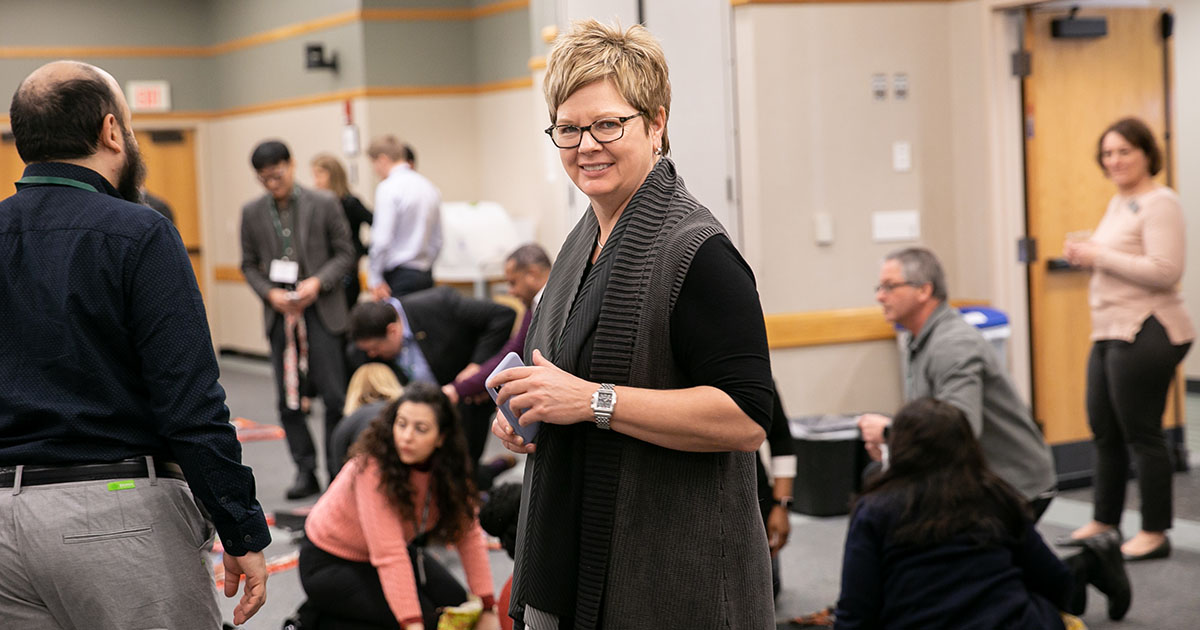A Week with Heidi Neck: Access, Connection, Inspiration

The room is full. Actors in university-based entrepreneurship education ecosystems from around the world sit at large, round tables. Some are on phones. Most have laptops. Many take pictures.
There are two Babson professors scanning the room, welcoming participants. There is energy.
This is the Santander Universities Academic Entrepreneurs program, taught by superstar professors Heidi Neck and Candida Brush, Babson’s Vice Provost of Global Entrepreneurial Leadership. And, it’s all about the entrepreneurship education ecosystem.
Day 1
Outside the large conference room is an array of sweet and savory treats, a coffee station and a refrigerator full of waters and juices. Inside, participants from around the world are ready to go. This is day one of a 4½-day workshop.
“You’re starting new things within the context of the university system; you are academic entrepreneurs,” said Neck at the outset. She is a hands-on, energetic force who stays in constant motion.
“There is no recipe for entrepreneurship education,” she explains to a symphony of nodding heads. “It’s really about developing ourselves and growing entrepreneurs.”
And, so, the excited participants are launched into the program, or as Neck points out, “It’s a workshop, not a program.”
Next we see why.
Puzzles and Quilts
Neck starts out the day with an exercise.
She first has teams put together jigsaw puzzles as fast as they can—the first team to complete their puzzle wins.
Next, she has teams dump bags of loose fabrics onto their tables and put together quilts—she states the only goal is to build the best quilt they can.
Neck then asks the participants to raise their hands—did they like doing the puzzle or the quilts better? The room was split.
The takeaway?
Puzzles have clearly defined rules and outcomes, people are familiar with them, and you know when you’re done. Quilts, on the other hand, are more creative and involve taking action and seeing a quilt design unfold. The outcomes vary, the paths to creation are different, and teams have ownership.
Neck then reveals that the puzzle people “learn in order to act” while the quilt people “act in order to learn.” She also explains that managers think in jigsaw puzzles and entrepreneurs think in quilts.
She is quick to point out, however, that it is essential to have both puzzle people and quilt people in every organization to achieve success.
Ecosystem Explained
“The Santander Universities Academic Entrepreneurs program is for those where their primary role is not necessarily teaching in the classroom,” says Neck. “It’s a lot of center directors, program leads, deans, or administrators who are trying to build and grow their entrepreneurship education ecosystem.”
And, since the participants do interact with students on some level, Neck combines the ecosystem development topics with Babson’s approach to teaching entrepreneurship.
“Within the program, we see two different parts: the ecosystem development, and also the teaching and how we facilitate that, so it’s a combination of both,” said Neck.
Much of what Neck refers to when talking about the Santander Universities Academic Entrepreneurs program blends into the idea of the university ecosystem.
“An ecosystem is comprised of three different aspects: What we’re doing inside the classroom—curricular, what we’re doing outside the classroom—cocurricular, and what we’re doing from a research perspective. And, those three aspects create vibrancy and feed off of one another,” said Neck.
A Valued Partnership
The Universities Academic Entrepreneurs program is part of the Babson Academy—a division of Babson College that provides faculty, administrators, and students of other educational institutions access to Babson’s thriving entrepreneurial ecosystem.
The program is sponsored by Santander Universities. Created in 1996, the Santander Universities program supports the higher education sector in areas such as entrepreneurial initiatives, and innovation.
The Universities Academic Entrepreneurs program, through this collaboration, is available to global educators in the extensive Santander Universities network.
Unique Benefit
Drawn to Babson by the promise of learning Babson’s secret sauce, the program participants leave with access, inspiration, and connection.
“Access to what Babson does and how we do it, so we’re actually unveiling what goes on behind the curtain,” explained Neck. “Inspiration to think about their own roles and how they can elevate what they are doing and be more entrepreneurial.”
Neck saved the best for last. “And, then connections to one another—these are the global networks that are created here—and they keep up with one another after the program because we keep them small and tight and intense,” said Neck with a proud smile.
As Heidi Neck took a moment between sessions, the pure enjoyment she gets from teaching came through.
“I love interacting with other educators broadly defined because I always learn something new. It doesn’t get stale for me.”
Posted in Community



